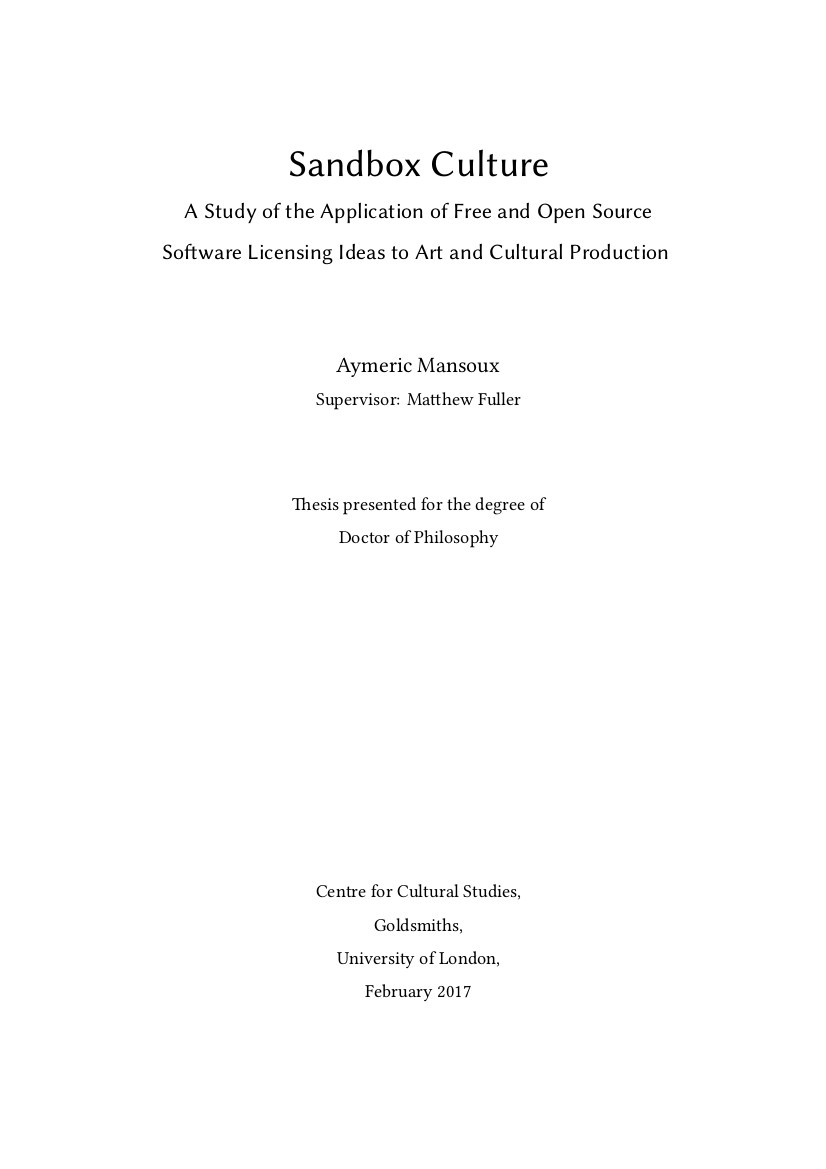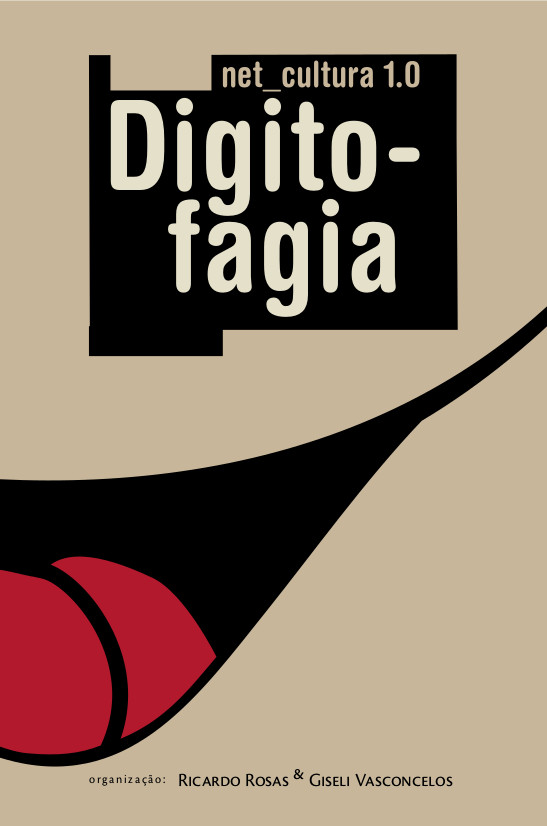Aymeric Mansoux: Sandbox Culture: A Study of the Application of Free and Open Source Software Licensing Ideas to Art and Cultural Production (2017)
Filed under thesis | Tags: · agonism, copyright, cultural production, digital culture, floss, free culture, intellectual property, law, network culture, open source, social movements

“In partial response to the inability of intellectual property laws to adapt to data-sharing over computer networks, several initiatives have proposed techno-legal alternatives to encourage the free circulation and transformation of digital works. These alternatives have shaped part of contemporary digital culture for more than three decades and are today often associated with the “free culture” movement. The different strands of this movement are essentially derived from a narrower concept of software freedom developed in the 1980s, and which is enforced within free and open source software (FLOSS) communities. This principle was the first significant effort to articulate a reusable techno-legal template to work around the limitations of intellectual property laws. It also offered a vision of network culture where community participation and sharing was structural.
From alternate tools and workflow systems, artist-run servers, network publishing experiments, open data and design lobbies, cooperative and collaborative frameworks, but also novel copyright licensing used by both non-profit organisations and for-profit corporations, the impact on cultural production of practices developed in relation to the ideas of FLOSS has been both influential and broadly applied. However, if it is true that FLOSS has indeed succeeded in becoming a theoretical and practical model for the transformation of art and culture, the question remains at which ways it has provided such a model, how it has been effectively appropriated across different groups and contexts and in what ways these overlap or differ.
Using the image of the sandbox, where code becomes a constituent device for different communities to experience varying ideologies and practices, this dissertation aims to map the consequent levels of divergence in interpreting and appropriating the free and open source techno-legal template. This thesis identifies the paradoxes, conflicts, and contradictions within free culture discourse. It explores the tensions between the wish to provide a theoretical universal definition of cultural freedom, and the disorderly reality of its practice and interpretation. However, despite the different layers of cultural diffusion, appropriation, misunderstanding and miscommunication that together form the fabric of free culture, this dissertation argues that, even though feared, fought, and criticised, these issues are not signs of dysfunctionality but are instead the evidence of cultural diversity within free culture. This dissertation will also demonstrate that conflicts between and within these sandboxes create a democratic process that permits the constant transformation of the free and open source discourse, and is therefore something that should be embraced and neither resisted nor substituted for a universal approach to cultural production.”
Includes an anthology of proto-free culture licenses, 1998-2002 (pp 382-452).
PhD Dissertation
Supervisor: Matthew Fuller
Publisher Centre of Cultural Studies, Goldsmiths, University of London, 2017
xxxviii+486 pages
via author
Ricardo Rosas, Giseli Vasconcelos (eds.): net_cultura 1.0: Digitofagia (2006) [BR-PT]
Filed under book | Tags: · activism, anthropophagy, art, brazil, cyberfeminism, digital culture, hacktivism, media activism, politics, tactical media, technology, web

A collection of essays contextualizing actions and initiatives in Brazil’s net culture and hacktivism, edited by the late Ricardo Rosas and Giseli Vasconcelos and coming out of their experience creating Festival Digitofagia in 2004.
“Digitofagia é resultado de um processo coletivo de pensamento gerado durante a concepção, planejamento e realização de um festival de mídia tática, no Rio de Janeiro e em São Paulo, no ano de 2004, que discutiu, entre outras coisas, a necessidade urgente de “abrasileirar” práticas de mídia-ativismo que até então eram teorizadas, praticadas e planejadas sob a influência de teorias e práticas aparentemente alheias ao contexto brasileiro.
A concepção de Digitofagia foi pensar uma pratica antropofágica que se reatualiza no contexto da cultura digital, reabastecendo seu viés libertário. Para tanto, abraçar práticas espontâneas na cultura contemporânea brasileira, como a pirataria, os camelôs e a gambiarra, seria, quem sabe, formas de trazer a mídia tática para um campo mais familiar e mais cotidiano aos praticantes, teóricos e activistas brasileiros. Afinal, a própria cultura brasileira é um codigo (em) aberto.”
“Composto por 35 textos de escritores, ativistas, pesquisadores, acadêmicos e artistas preocupados com os caminhos do ativismo político-artístico nos tempos da globalização digital, Digitofagia é fruto da inesgotável energia e alegria de Ricardo Rosas (1969-2007), que primeiro pensou e organizou, ao lado de Giseli Vasconcelos, os textos selecionados para este volume.”
Publisher Radical Livros, São Paulo, with Sarai/CSDS, Delhi, and Waag Society, Amsterdam, 2006
Creative Commons BY-SA-NC 2.5 Brazil
ISBN 8598600048, 9788598600048
347 pages
Commentary: Paul Keller (2009), Geert Lovink (2009).
Comment (0)Addie Wagenknecht, et al.: Deep Lab (2014)
Filed under book | Tags: · art, cyberfeminism, digital culture, feminism, internet, media infrastructure, privacy, security, surveillance, technology, web

“Deep Lab book is a compilation of reflections on digital culture, the post-Snowden Internet, and cyberfeminism. Created in five days by a dozen women, it represents the capstone to Deep Lab, a congress of cyberfeminist researchers, organized by Frank-Ratchye STUDIO Fellow Addie Wagenknecht to examine how the themes of privacy, security, surveillance, anonymity, and large-scale data aggregation are problematized in the arts, culture and society.
During the second week of December 2014, the Deep Lab participants—a group of internationally acclaimed new-media artists, information designers, data scientists, software engineers, hackers, writers, journalists and theoreticians—gathered to engage in critical assessments of contemporary digital culture. They worked collaboratively at the STUDIO in an accelerated pressure project, blending aspects of a booksprint, hackathon, dugnad, charrette, and a micro-conference. The outcomes of this effort include the visualizations, software, reflections and manifestos compiled in this book; an album of ten lecture presentations, the Deep Lab Lecture Series; and a documentary film featuring interviews with the Deep Lab participants.”
By Addie Wagenknecht, Allison Burtch, Claire L. Evans, Denise Caruso, Harlo Holmes, Ingrid Burrington, Jillian C. York, Jen Lowe, Kate Crawford, Lindsay Howard, Lorrie Faith Cranor & CUPS, Maddy Varner, Maral Pourkazemi, and Runa A. Sandvik.
Publisher Deep Lab and Frank-Ratchye STUDIO for Creative Inquiry at Carnegie Mellon University, Dec 2014
Creative Commons BY-NC-SA 4.0 License
ISBN 978-1-312-77551-0
234 pages
PDF, PDF (109 MB, updated on 2018-4-14)
Deep Lab Lectures Series (10 videos, Dec 2014)
Documentary (18 min)

